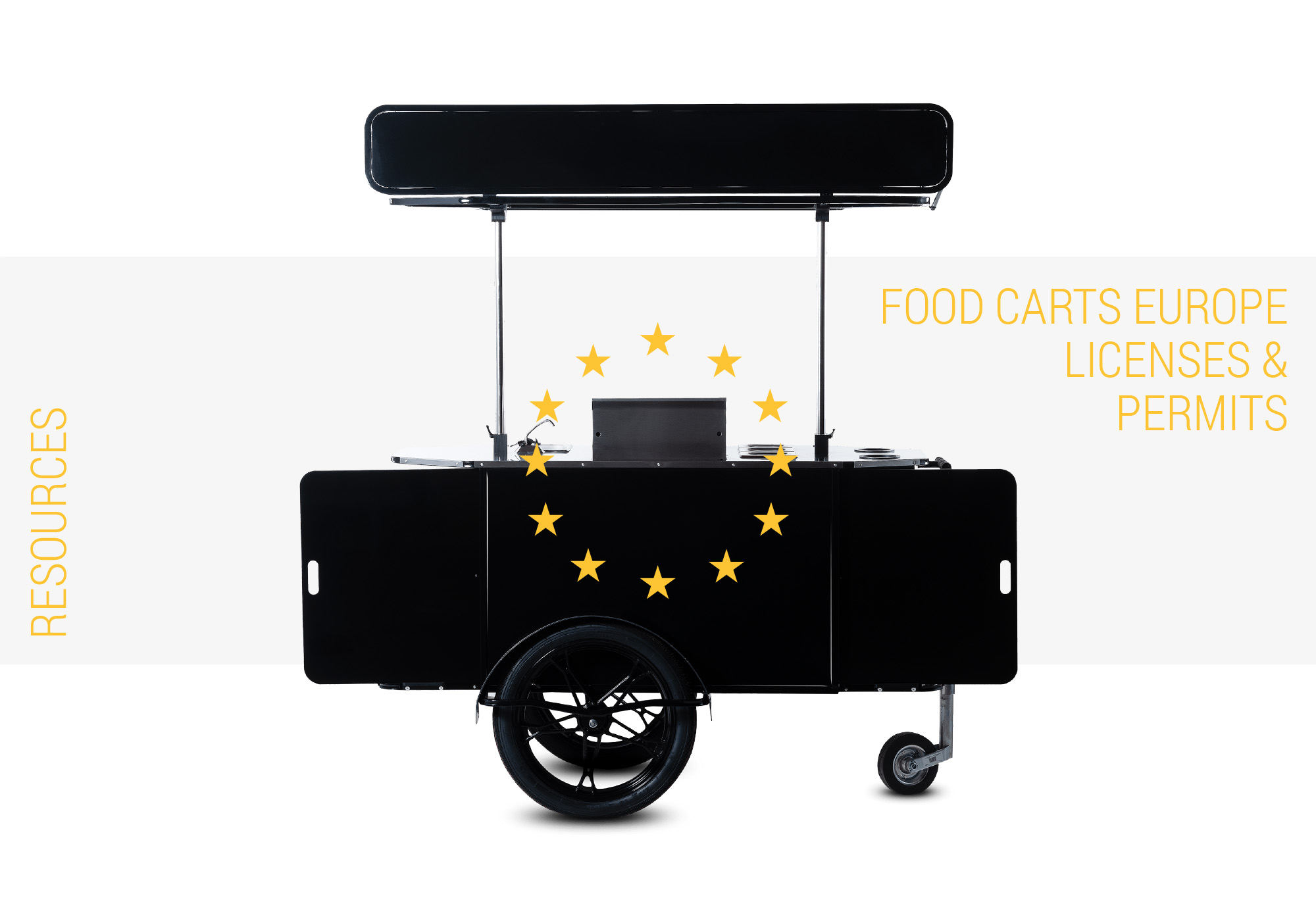Food Carts Europe: Licenses, Permits and Legal Requirements

As street food carts manufacturers, we often get questions from our customers – especially first-time entrepreneurs – about street food regulations in various European countries and the licenses and paperwork required to start a mobile street food business.
Since the legal requirements concerning street food vending vary from country to country and even city to city, it would be a close to impossible task for us to provide a comprehensive answer to each of these questions.
However, we’d love to help every single one of you with at least a couple of pointers in the right direction.
For this purpose, we put together a guide with the legal and the administrative steps involved in starting a food cart business for the following European countries:
[we will update this guide regularly, with more countries to follow every week]
Food Carts Belgium – Licenses, Permits & Legal Requirements
With a strong tradition of street food staples – frites, waffles and sausages, anyone? – Belgium has its rightful place on the European Street Food map, especially with the new breed of entrepreneurs taking things to the next level.
But how easy is it to start a mobile street food business in Belgium?
The short answer is: quite simple, provided you have a solid business plan. Here’s what you need to do:
Preemptive step: check with your local authorities what are the requirements concerning the type of food you are going to sell, including the set-up of your food cart.
- In order to start your business, either as a self-employed individual or as a SME, you must first register with the “Banque Carrefour des Entreprises” (BCE) at your local business counter (ondernemingsloket) or a notary.
- Register with the tax authorities in your region and get a VAT number for your business.
- Apply for an itinerant merchant card (leurkaart). As a business owner and/or employer, you’ll need a card for yourself and an auxiliary card for anyone else working with you. Both can be obtained at your local business counter (ondernemingsloket).
- Besides your itinerant merchant card, you will also need a license to sell street food from the municipality (commune) where you want to operate.
- Apply for a permit from the Agence Fédérale pour la Sécurité de la Chaine Alimentaire (AFSCA) that proves the safety of your food. You will need to do a mandatory training first and AFSCA will do regular inspections to your place of trade.
- Obtain a license to sell alcohol, if applicable (from your municipality).
- Apply for an environmental permit for your cart’s equipment. This can be done at your municipality and, in order to obtain it, you must have your food cart’s gas and electrical installation certified by an approved body.
- Get a medical certificate for food handling.
- Get your food cart/business insured, if applicable.
These are, at large, the steps that must be completed in order to sell street food in Belgium. For detailed information about all the necessary documents and where you can get them, visit the urbanisation department at your local municipality.
Food Carts Denmark – Licenses, Permits & Legal Requirements
Having no less than 24 Michelin-starred restaurants, Denmark is renowned for its fine dining scene but its street food markets are equally appealing and rising in popularity.
And the good news doesn’t stop here: when it comes to starting a business in Denmark, the process is one of the most straightforward in Europe.
Here’s what setting up a mobile street food business in Denmark entails:
Preemptive step: check with your local authorities what are the requirements concerning the type of food you are going to sell, including the set-up of your food cart.
- Choose a business type, such as a partnership or a private limited liability company, and incorporate your business.
- Register your company with the Danish Business Authority and get its Central Company Register Number (CVR).
- Register with the tax authorities in your area for VAT purposes.
- Register with the Danish Veterinary and Food Administration and apply for authorization to sell food. If your activities require approval, you will be contacted by the DVFA who will visit your premises before an approval can be granted.
- Obtain your street vending permit from the Danish Business Authority. The permit will be valid for one calendar year and must be renewed every year.
Good to know:
- While street food vending is allowed in Denmark, selling certain goods such as alcohol, tobacco, chocolates and over-the-counter medicine is prohibited. Please double check these restrictions with your local authorities.
- If you’re planning to sell in a park, you need to pay a market rent fee.
- When it comes to obtaining your vending permit, different conditions may apply according to the size of your cart and specific to the area you’ll be conducting your business in. For example, in Copenhagen, small food carts (under 2.5 sqm) may be placed in public squares and pavements, while large carts (over 2.5 sqm), such as food trucks or vans, may be placed in parking lots.
- Beside the push-cart, you must set up a conspicuous poster with the name and address of the enterprise owner, as well as the enterprise’s CVR/VAT no. (if the enterprise has a CVR/VAT no.). A written copy of this information must be distributed to customers upon request.
For more information about setting up a food cart business in Denmark, click here.
Starte en gade fødevarevirksomhed? Se vores salsvogne til salg her!
Food Carts France – Licenses, Permits & Legal Requirements
The French love for good food and sophisticated flavours also reflects in its street food culture. From their famed baguette sandwiches and decadent crepes to gourmet burgers with truffle frites, there are plenty of delicious foods to indulge with on the streets of France.
So what does it take to become a street food vendor?
If you’re planning on starting a food cart business, here are the steps:
Preemptive step: check with your local authorities what are the requirements concerning the type of food you are going to sell, including the set-up of your food cart.
- If you’re a first-time entrepreneur or unemployed, the best way to start would be to register with your local pôle emploi. Since you’ll be expected to complete several training courses concerning your street food business, such as food safety and hygiene, they can help by covering the costs.
- The second step would be to register your new business. If you’ll be selling pre-made or processed foods such as sweets or canned drinks you need to register with the Chambre de Commerce. If, on the other hand, you’ll be cooking, then you need to register with the Chambre de Métiers. There is also a chance you’ll have to register with both, in which case the Chambre de Métiers will transmit your registration to the Chambre de Commerce.
- Sign-up for HACCP training to get your food safety & hygiene certification. pôle emploi can help you sign up for this.
- Get your Carte de Commerce Ambulant, which is basically a mobile vending license that will cost around €15.
- Contact your local Town Hall (La Mairie) and apply for permission to park. The cost of this will vary depending on the chosen location, and the permit will be valid either for a year or just the season.
- If applicable: get a liquor license to be able to sell alcoholic beverages. To obtain it, you need to take an obligatory three day training course.
- Register your business with the Direction Departementale de Protection des Populations two weeks before opening. This department will carry out hygiene inspections.
- Get a business or a public liability insurance, if applicable.
Good to know:
– While trading, you should have a price list and your business opening hours on display at all times.
– When it comes to securing a parking permit, cities like Paris are difficult to get into and the prices are high. Cities outside of Paris offer much more opportunity and flexibility of dates and times.
Démarrer une entreprise de cuisine de rue? Voir nos chariots de nourriture à vendre ici!
Food Carts Italy – Licenses, Permits & Legal Requirements
From North to South, Italy has plenty of street food delicacies, ranging from famed local classics to tasty snacks with an exotic twist. And with two of its cities – Rome and Palermo – featured in the top 20 street food hotspots in the world, it’s quite clear that Italy has absolutely mastered the art of serving food anywhere, anytime.
When it comes to selling it, here are the requirements:
Preemptive step: check with your local authorities what are the requirements concerning the type of food you are going to sell, including the set-up of your food cart.
- Obtain a street food vending license, which can be Type A – for itinerant trade with fixed parking, or Type B – for itinerant travelling trade. Both are issued by your local Municipality.
- Get your certificate of registration in the REC (Italian Trade Register) as a food trader.
- Complete a professional certification course for food and beverage safety & hygiene, organized or recognized by the Region.
- Request an administrative authorization for selling street food from your local Municipality.
- Register your business for VAT and open a position to INAIL and INPS. These can be carried out through the Comunicazione Unica.
Good to know:
In order to start a street food business in Italy, you must:
– have been a holder, partner, qualified employee or collaborator in an activity for at least 2 years in the last 5 years;
– being at least a graduate or, better, a graduate with relevant academic qualifications.
Avviare un’attività di street food? Guarda i nostri carrelli di vendita di alimenti qui.
Food Carts Netherlands – Licenses, Permits & Legal Requirements
The Netherlands may not be a famous culinary destination but its street food scene is surprisingly diverse. Alongside its famed stroopwafel, frikandel and, of course, the raw herring, you’ll also find popular dishes from the Indonesian, Turkish or Jewish cuisine.
…starting a food cart business, here’s what you should do:
Preemptive step: check with your local authorities what are the requirements concerning the type of food you are going to sell, including the set-up of your food cart.
- Register your business at the Dutch Chamber of Commerce as a mobile street trade. They will automatically pass on your details to the Dutch Tax and Customs Administration, which will send you your VAT number and ID by post (usually within two weeks).
- Obtain a street / market / or pedlar’s trading licence from the municipal authorities.
- Contact the Food and Consumer Product Safety Authority (NVWA) and inquire about the food safety & hygiene requirements applicable to your business such as training and certifications.
- Create a HACCP food safety plan.
- If applicable, apply for a liquor license, in which case you’ll also need a SVH Social Hygiene Diploma which concerns the responsible sale of alcohol.
- Will you play music to your customers? Then get in touch with Buma/Stemra for music rights and costs.
- Optional: take out an insurance to cover your food cart and inventory.
Good to know:
– Obtaining a permit often takes 8 to 12 weeks, so make sure you submit the application to the municipality on time.
– Have you come up with a cool company name? Not everything is allowed, check the rules for company names.
Voedselkar beginnen? Zie onze voedsel karren die te koop zijn.
Food Carts UK – Licenses, Permits & Legal Requirements
Part traditional, part exotic, UK’s street food scene is a melting pot of flavours, perfectly mirroring the country’s rich cultural heritage as well as its blossoming diversity.
Provided you’re well-equipped to put up with the country’s moody weather, here are the steps for starting a food cart business in the UK:
Preemptive step: check with your local authorities what are the requirements concerning the type of food you are going to sell, including the set-up of your food cart.
- Incorporate your business and register with the tax authorities for VAT purposes.
- Register your food business with your local authority at least 28 days before opening, a mandatory step in order to sell food within the UK.
- Check with your local council and see if you need a street trading licence for the area where you’re planning to trade.
- Get the Level 2 Food Hygiene Certificate, mandatory for you and for each of your staff members. This is usually done by completing a day’s course with the Chartered Institute of Environmental Health or the Nationwide Caterers Association (NCASS).
- Have your food cart’s gas and electrical installations checked and approved by registered professionals: you need an LPG gas certificate from a registered gas installer and your electrical appliances must be PAT tested by a qualified electrician.
- Create and implement a HACCP (hazard analysis and critical control point) plan for cooking, storing and transporting your food in a safe manner.
- Get public liability insurance, if applicable.
Good to know:
- By law, all food businesses must have separate hand and pot washing facilities.
- You must have the requisite fire-fighting equipment on-site at all times.
- You also need to have digital and physical copies of your certifications and permits on-site at all times.






